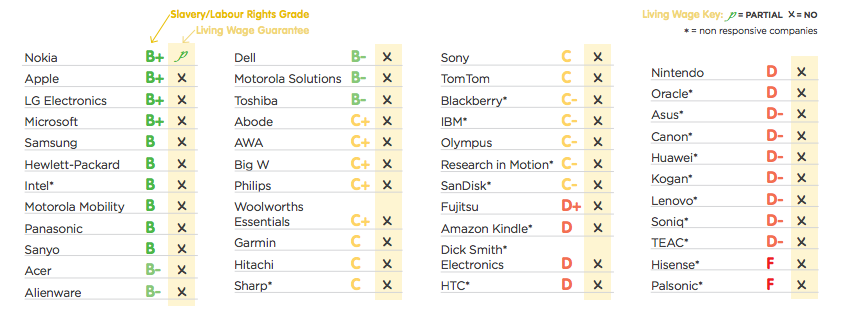Electronics brands like Apple and Samsung still have a long way to go to meet ethical concerns
Hardly any electronics companies pay their workers enough to meet their basic needs, according to a new report by Baptist World Aid and the Not For Sale campaign.
Almost two thirds of Australians own a smartphone, but do we know who’s really making them and what their working conditions are like?
Someone somewhere in the world is putting together the thing that you use everyday, every hour. The Behind the Barcode report and associated ethical electronics consumer guide has graded 39 electronics brands, including Apple, Samsung, LG and Microsoft, on their efforts to guard against the use of child and forced labour and worker exploitation in the production of their devices and products.
The brands were given a grade from A-F on these efforts, based on the companies answers to a series of questions on production policies and practices or, if the company was unresponsive, from publicly available Corporate Social Responsibility policies and third-party audits.
Topping the list were Nokia, Apple, LG Electronics and Microsoft, all scoring B+ grades. But Baptist World Aid Advocacy Manager, Gershon Nimbalker says the biggest concern that has come out this report is a failure by most companies to provide a ‘living wage’.
The minimum wage rate in many countries is so low that it doesn’t cover a family’s basic cost of living. A ‘living wage’ that does meet those basic costs, is what Nimbalker says should be the aim for all electronics companies.
“Payment of a living wage is among the most persistent issues raised by workers in developing countries and one of the most dependable measure of improved worker well-being,” the report states.
Yet the report found 97 per cent of companies weren’t paying their workers enough to meet their basic needs. Only Nokia could demonstrate with sufficient evidence that they were.
“Workers in developing countries work long hours in often oppressive conditions to make the phones, TVs and tablets that we enjoy,” says Nimbalker.
“The additional cost to ensure that they are rewarded for their efforts with a wage that is sufficient for the and their families to live is only a few dollars per product. By some estimates, as little as two to nine dollars per smart phone or less than 1.5% of the total price.”
The inclusion of Apple in the top four performing companies may come as a surprise to many, given the public concerns about poor working conditions and child labour in its Chinese supplier plants like Foxconn and Pegatron. But the report clarifies that the rating system is on a curve, and the B category was given “not because [the companies assessed] supply chains are free of abuse, but because they were doing relatively more to proactively address these issues.
“These companies trace and effectively monitor a good portion of their supply chain, with a few going further to implement grievance mechanisms and policies to remediate child labour.”
For example, in February this year Apple released its annual survey of its international supply chain, which uncovered fewer child labour cases than the year before.
Hisense and Palsonic scored lowest in the grading system, given an F. Brands including Amazon Kindle, Canon, Asus and Lenovo scored a D or D-.
The grades have been condensed into a pocket-sized Ethical Electronics Guide, to encourage consumers to think before they buy.
But Nimbalker says there is still a long way for companies to go before their reporting practices reach the standards consumers should expect.
“We’d like to see the industry become more transparent about their initiatives so consumers can make their ethical purchasing decisions easily,” he says.
“We know that when consumers call for change, they have the power to transform the practices of companies and through them the communities they work with.”
To read the full report, visit behindthebarcode.org.au

Email This Story
Why not send this to a friend?
